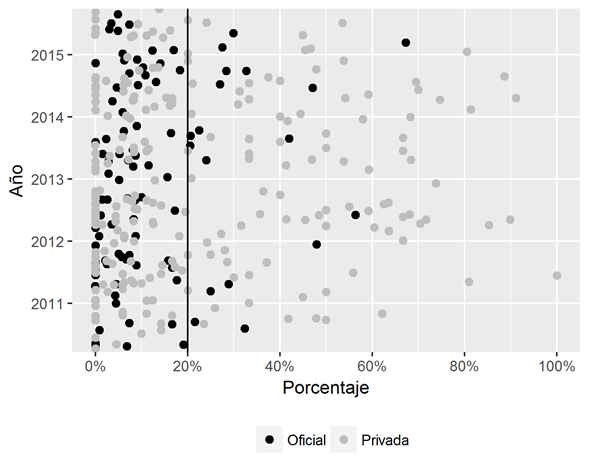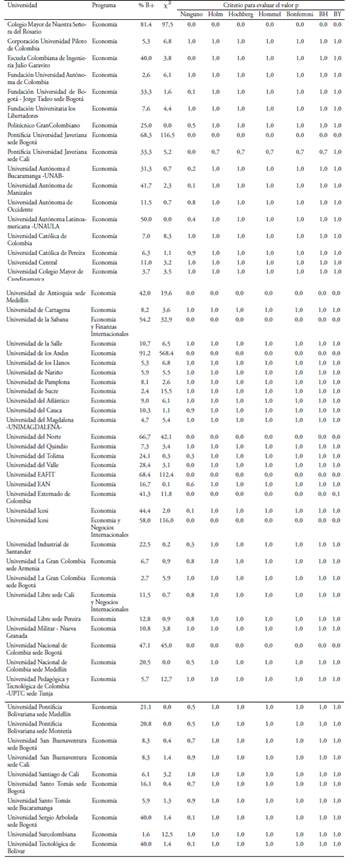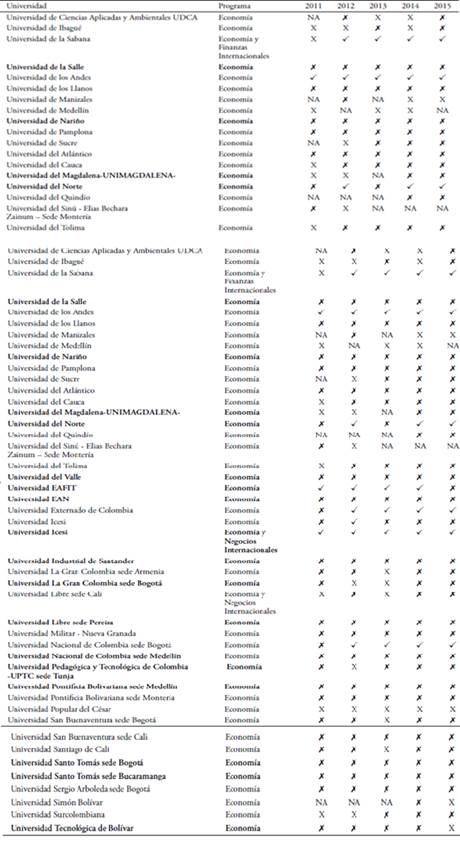English level in bachelor programs in Economics in Colombia: has the goal been reached?
DOI:
https://doi.org/10.17533/udea.le.n89a02Keywords:
English, higher education, Economics programs, educational policy of bilingualism, Saber Pro.Abstract
This paper assesses whether college graduates from bachelor programs in Economics in Colombia have achieved the bilingualism goal proposed by the government for 2014. To this end, we use a descriptive approach and inferential statistics (parametric and non-parametric proportions tests) using data from the English module of the standardized test Saber Pro (2011-2015). We find that, at the national level, 54 out of 61 bachelor programs did not meet the goal and that only 7 out of the 21 accredited programs in the country have reached it. These results suggest the need to rethink the public policy of bilingualism in the education of Colombia’s future economists.
Downloads
References
Alonso, Julio César; Casasbuenas, Paola; Gallo, Beatriz & Torres, Giselle (2012). Bilingüismo en Santiago de Cali: Análisis de los resultados de las Pruebas SABER 11 y SABER PRO. Cali, Universidad Icesi. Recuperado de http://www.icesi.edu.co/cienfi/bilinguismo/images/stories/Bilinguismo_en_Santiago_de_Cali.pdf (mayo 1 de 2017).
Alonso, Julio César; Estrada, Daniela & Martínez, Diego (2016). “¿Se cumplió la meta de bilingüismo en los programas de educación universitaria del sector software en Colombia?”, Revista Educación en Ingeniería, Vol. 12, No. 22, pp. 39-45.
Aslanbeigui, Nahid & Montecinos, Veronica (1998). “Foreign students in US doctoral programs”, The Journal of Economic Perspectives, Vol. 12, No. 3, pp. 171-182.
Benjamini, Yoav & Hochberg, Yosef (1995). “Controlling the false discovery rate: a practical and powerful approach to multiple testing”, Journal of the Royal Statistical Society. Series B (Methodological), Vol. 57, No. 1, pp. 289-300.
Ferguson, Gibson; Pérez-Llantada, Carmen & Plo, Ramón (2011). “English as an international language of scientific publication: A study of attitudes”, World Englishes, Vol. 30, No. 1, pp. 41-59.
Ferreyra, Horacio Ademar; Gallego, José Duván Marín & de Sarmiento, Marta Osorio (2015). “La evaluación institucional de la educación superior en Colombia: Aproximación a un estado de la cuestión”, Revista Latinoamericana de Políticas y Administración de la Educación, Vol. 2, No. 2, pp. 138-148.
Flowerdew, Jhon (1999). “Problems in writing for scholarly publication in English: The case of Hong Kong”, Journal of Second Language Writing, Vol. 8, No. 3, pp. 243-264.
Flowerdew, John (2015). “Some thoughts on English for Research Publication Purposes (ERPP) and related issues”, Language Teaching, Vol. 48, No. 2, pp. 250-262.
Hamel, Rainer Enrique (2008). “The dominance of English in the international scientific periodical literature and the future of language use in science”, AILA Review, Vol. 20, No. 1, pp. 53-71.
Holm, Sture (1979). “A simple sequentially rejective multiple test procedure”, Scandinavian Journal of Statistics”, Vol. 6, No. 2, pp. 65-70.
Hochberg, Yosef (1966). “A sharper Bonferroni procedure for multiple tests of significance”, Biometrika, Vol. 75, No. 4, pp. 800-802.
Hommel, Gerhard (1998). “A stagewise rejective multiple test procedure based on a modified Bonferroni test”, Biometrika, Vol. 75, No. 2, pp. 383-386.
Ku, Hyejin & Zussman, Asaf (2010). “Lingua franca: The role of English in international trade”, Journal of Economic Behavior & Organization, Vol. 75, No. 2, pp. 250-260.
Ministerio de Educación Nacional (MEN) (s.f a). Programa Nacional de Bilinguismo Colombia 2004-2019. Recuperado de http://www.mineducacion.gov.co/1621/articles-132560_recurso_pdf_programa_nacional_bilinguismo.pdf (abril 4 de 2017).
Ministerio de Educación Nacional (MEN) (s.f b). Colombia Bilingüe 2014-2018. Recuperado de http://www.colombiaaprende.edu.co/html/micrositios/1752/w3-article-315515.html (abril 4 de 2017).
Ministerio de Educación Nacional (MEN) (2013). Orientaciones para la Implementación de Proyectos de Fortalecimiento de Inglés en las Entidades Territoriales. Bogotá D.C.: Autor. Recuperado de: http://www.colombiaaprende.edu.co/html/micrositios/1752/articles-315518_recurso_5.pdf (abril 4 de 2017).
Ministerio de Educación Nacional (MEN) (2014). Colombia Very Well! Programa Nacional de inglés. Recuperado de: http://www.colombiaaprende.edu.co/html/micrositios/1752/articles-343287_recurso_1.pdf (abril 4 de 2017).
R Core Team (2016). R: A language and environment for statistical computing [software]. R Foundation for Statistical Computing. Vienna, Austria. Disponible en https://www.R-project.org/.
Sánchez, Andrés (2013). “Bilingüismo en Colombia”, Documentos de trabajo sobre Economía Regional, No. 191. Banco de la República.
Yekutieli, Daniel & Benjamini, Yoav (1999). “Resampling-based false discovery rate controlling multiple test procedures for correlated test statistics”, Journal of Statistical Planning and Inference. Vol. 82, No.1, pp. 171-96.
Downloads
Published
How to Cite
Issue
Section
License
Copyright (c) 2018 Julio César Alonso Cifuentes, Daniela Estrada Nates, Brigitte Vanesa Mueces Bedon

This work is licensed under a Creative Commons Attribution-NonCommercial-ShareAlike 4.0 International License.
This page, by Universidad de Antioquia, is licensed under a Creative Commons Attribution License.
Authors who publish with this journal agree to retain copyright and grant the journal right of first publication, with the article licensed under a Creative Commons Attribution-NonCommercial-ShareAlike License allowing others to share it as long as they acknowledge its authorship and original publication in this journal.
Authors can enter into separate, additional contractual arrangements for the non-exclusive distribution of the journal's published version of the work (e.g., post it to an institutional repository or publish it in a book), provided that these arrangements be not for profit and the journal be acknowledged as the original source of publication.
Authors are permitted and encouraged to post their papers online (e.g., in institutional repositories or on their websites), as it can lead to valuable exchanges as well as greater citation of the published work.


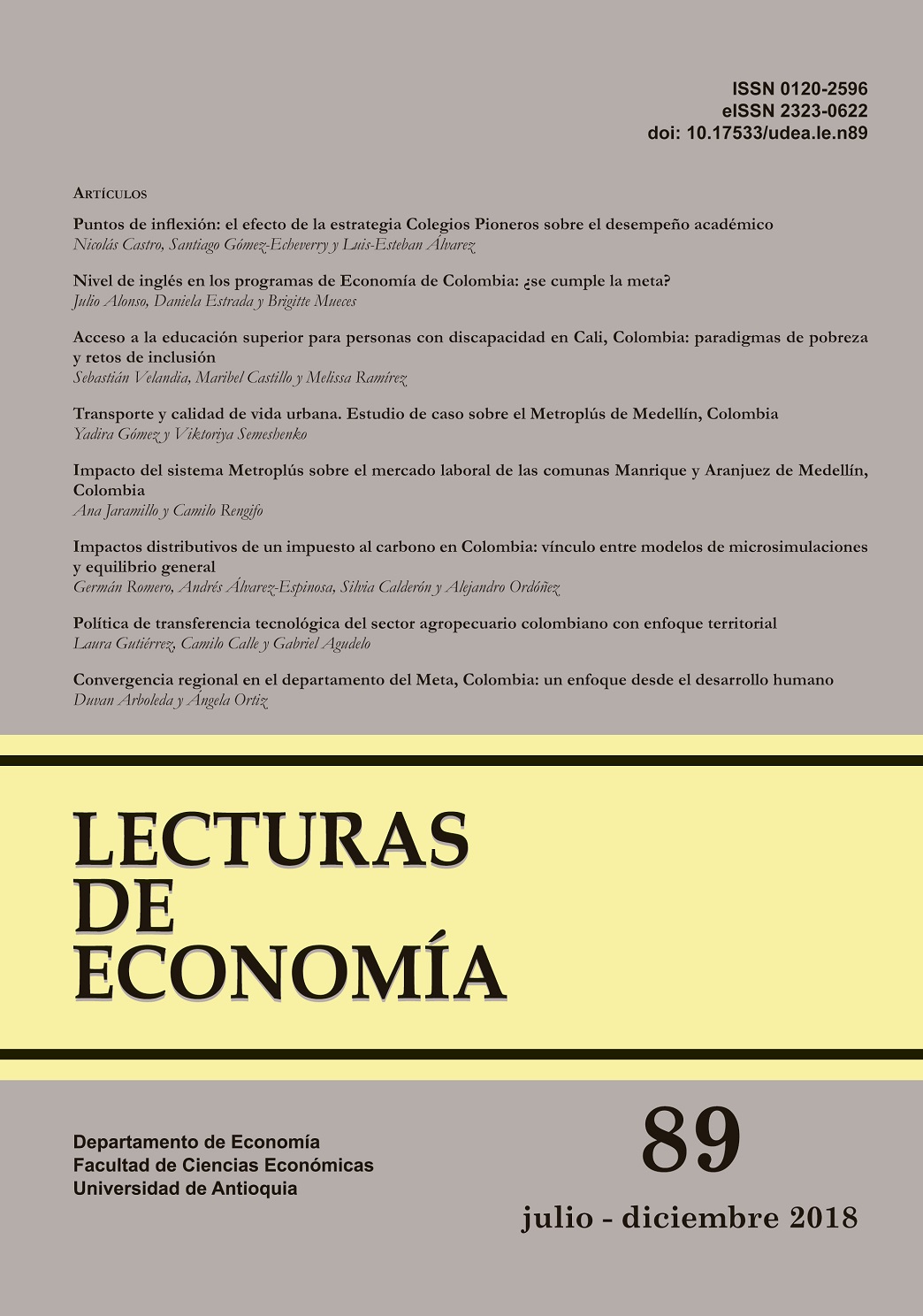




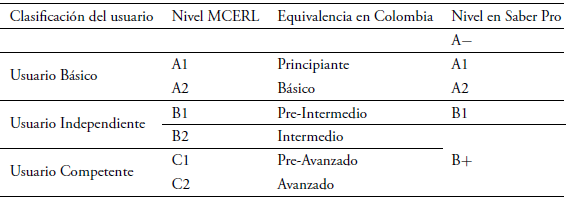
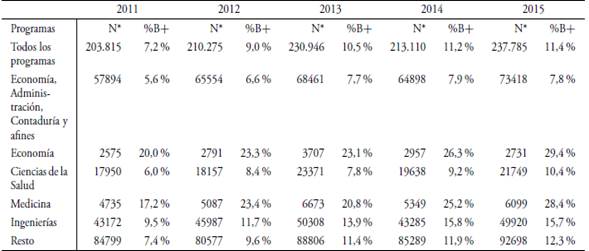


 representa la proporción observada de estudiantes de Economía que fueron clasificados en B+. Este estadístico nos permite contrastar la hipótesis nula de que la proporción observada es menor o igual al 0,2 (20%), frente a la hipótesis alterna de que tal proporción es mayor de 0,2; adicionalmente, sigue una distribución normal estándar cuando se realiza solamente una única comparación.
representa la proporción observada de estudiantes de Economía que fueron clasificados en B+. Este estadístico nos permite contrastar la hipótesis nula de que la proporción observada es menor o igual al 0,2 (20%), frente a la hipótesis alterna de que tal proporción es mayor de 0,2; adicionalmente, sigue una distribución normal estándar cuando se realiza solamente una única comparación.
 es el valor observado de individuos que clasificaron en B+, y
es el valor observado de individuos que clasificaron en B+, y  es el esperado de individuos en B+ si se hubiese cumplido la meta del 20%. Este estadístico permite contrastar las mismas hipótesis nula y alterna descritas en la prueba paramétrica, y sigue una distribución
es el esperado de individuos en B+ si se hubiese cumplido la meta del 20%. Este estadístico permite contrastar las mismas hipótesis nula y alterna descritas en la prueba paramétrica, y sigue una distribución  con 1 grado de libertad cuando se realiza una única comparación.
con 1 grado de libertad cuando se realiza una única comparación. 